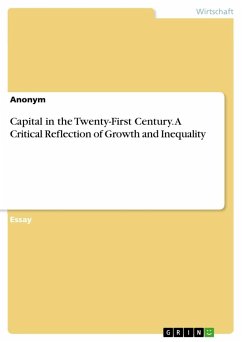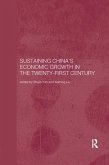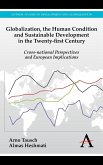Essay aus dem Jahr 2019 im Fachbereich BWL - Wirtschafts- und Sozialgeschichte, Note: 1.7, Zeppelin University Friedrichshafen, Sprache: Deutsch, Abstract: The question of income and wealth inequality is not a mere economic question but also a political with a social dimension. The distribution is chaotic, unpredictable and can change rapidly under different institutional conditions. Nevertheless, growth and inequality are central components of capitalism, as there have always been profiteers and losers from the distribution issue. In contrast to other bestsellers, The Capital in the 21st Century written by Thomas Piketty is widely discussed because the book contributes a serious and discourse changing view on the question of inequality. Piketty caused a great stir, especially among conservatives, in the course of 2014 and sparked manifold discussions not only among economists, but also in a broader public. The book can be differentiated between its historical contribution as well as the extrapolation of the past in order to predict future developments concerning growth and inequality as well as implications for the institutions in the 21st century. The aim of the following paper is therefore not to examine the historical correctness, but the general theoretical approach as well as the political implications. Accordingly, Piketty's explanations on growth and inequality are elaborated in chapter 2. Chapter 3 reflects "Capital in the 21st century" from the perspective of growth, while chapter 4 focuses on inequality. The paper concludes in chapter 5 with a summary of Piketty's arguments and a selection of counterarguments. Furthermore, limitations and an outlook are discussed.
Hinweis: Dieser Artikel kann nur an eine deutsche Lieferadresse ausgeliefert werden.
Hinweis: Dieser Artikel kann nur an eine deutsche Lieferadresse ausgeliefert werden.








